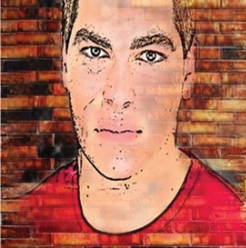
As I sat in the theater waiting for the show to start, a layer of haze began to shroud the room and give the space a surreal feel. It was almost as if the haze was a shield, designed to protect the world of the story from unprepared outsiders and draw viewers further into the experience. When the lights finally dimmed, the haze disappeared and I was transported to a place that was broken and forgotten, a crumbling world squatting on the edges of society. For the next two hours, this place and its inhabitants, a series of tragic characters whose hubris defies the reality of their grim situation, mesmerized me.
The play “Polaroid Stories” explores the lives of castaways in a no-man’s land. Each character leads a life that for some is a hopeless struggle but for others is a legend in the making. While many plays before have tackled the controversial and difficult themes of homelessness, abuse and drug addiction, what sets this story apart is its connection to Ovid’s epic poem “Metamorphoses.” Opening each scene is a title that combines modernity with antiquity as it guides viewers to the identity of primarily nameless characters. While each takes on labels of deities and heroes, such as Orpheus and Persephone, they are far from perfectly embodying the human condition. Rather, these characters corrupt their given identities and instead weave stories that depict the low points of humanity. For instance, instead of Prometheus searching to steal fire and nobly grant it to mankind, Skinhead Boy, played by Taylor Rasmussen (COL ’16) is desperately searching for drugs to fuel his own addiction. As the story progresses, each character defies reality and, rather than feeling helpless and sorry for themselves instead relish in the creation of their own myths and legends. With escape a distant hope, the characters try to elevate themselves from this wasteland by fashioning themselves into gods, kings, princesses and heroes in their minds.
The ensemble adeptly exhibits the show’s many complicated dichotomies: past and present, corruption and innocence, arrogance and humility. Eurydice, played by Natalia Ortiz (COL ’16) melds together prostitution’s stigma with the pureness of being Orpheus’ (Ben Prout (COL ’15)) one true love, while Echo (Aloysia Jean (COL ’16)) serves as a manifestation of hopeless devotion versus using one’s own voice and achieving individuality.
What really aided the actors is the level of attention to detail given to the set and other technical aspects. The stage, completely covered in trash, captures the desolation of these characters’ reality as they fall into the waste and become tossed away as remnants of society, all while living in their created fantasy worlds. The constant presence of scars and bruises on their faces also serves as a physical reminder that though they speak highly of themselves, they are far from immortal. One of the most memorable technical details during the show was the use of lighting and smoke to give the illusion of clouds filling the room, tricking the audience into believing that perhaps the characters have managed to escape from their material struggles and find a way to be transported to the golden halls of Mount Olympus. Once the smoke dissipates, however, we are returned once more to the hopeless underworld of their reality.
While overall the show is a strong one, criticisms would include the moments when the dialogue is difficult to process and the many stories feel like they are crudely jumbled together. In addition, those unfamiliar with Greek mythology would perhaps miss out on the subtle — and sometimes not so subtle — allusions and connections. That being said, however, Dan Galloway (COL ’13) and the rest of the production team’s direction have managed to craft a complex show that will leave viewers contemplating issues of social justice after the show has ended. Though the play itself features a locationless slum, the story, which borrows from Greek legends to highlight present-day strife, seems right at home in Washington, D.C., a city that has classically boasted palaces on one side of the street and struggling communities on the other. “Polaroid Stories” depicts the struggle of individuals whose hope of freedom is so dim that all there is left to do is relish in their own despair and become the kings and queens of a broken, illusory kingdom.








